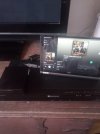MasterApex
Active Member
- Joined
- May 3, 2021
- Messages
- 135
- Likes
- 78
Recently I started to collect more speakers and amplifiers.
For many years, I have the opinion that amplifiers sounds the same (as long as they are driven too hard), DAC and cable interconnects sounds the same as long as they are decent quality.
I had compared my legacy Denon AVR 5808 Receiver vs Levinson 333 vs Benchmark AHB2 on my Martin Logan bookshelf speaker and B&W 640i Tower speakers, ; I don't hear sonic differences among the amplifiers.
However, when I use the amplifiers to drive B&W 802D3, I can hear sonic signature differences among the amplifiers. In some instances, the XLR cable interconnect can be audibly distinguishable.
As others are listening to compare amps , DACs, cables, etc...how do we know or identify whether our speakers are highly resolving?
Wondering because I was not able to hear the differences (amps, DAC, cables) with my older and bookshelf speakers.
For many years, I have the opinion that amplifiers sounds the same (as long as they are driven too hard), DAC and cable interconnects sounds the same as long as they are decent quality.
I had compared my legacy Denon AVR 5808 Receiver vs Levinson 333 vs Benchmark AHB2 on my Martin Logan bookshelf speaker and B&W 640i Tower speakers, ; I don't hear sonic differences among the amplifiers.
However, when I use the amplifiers to drive B&W 802D3, I can hear sonic signature differences among the amplifiers. In some instances, the XLR cable interconnect can be audibly distinguishable.
As others are listening to compare amps , DACs, cables, etc...how do we know or identify whether our speakers are highly resolving?
Wondering because I was not able to hear the differences (amps, DAC, cables) with my older and bookshelf speakers.

